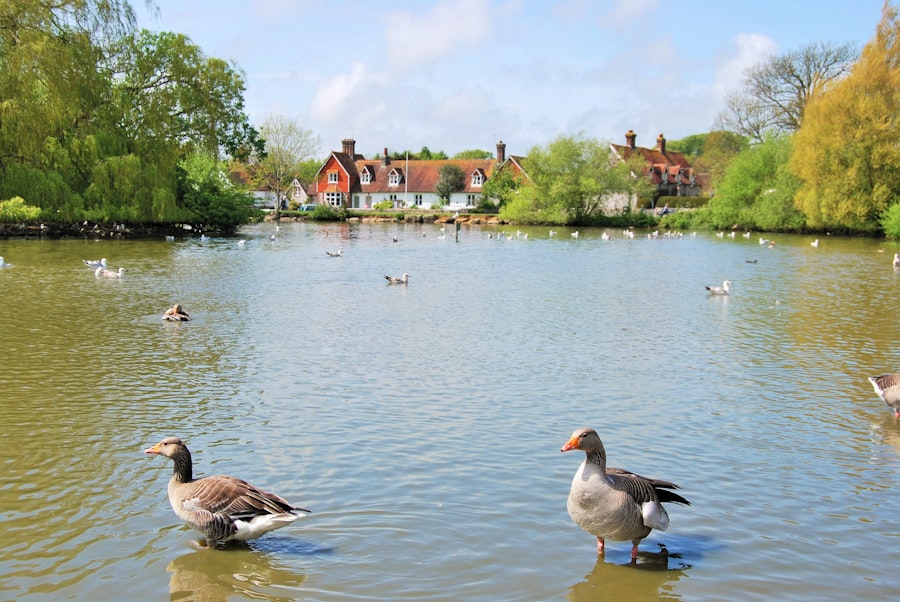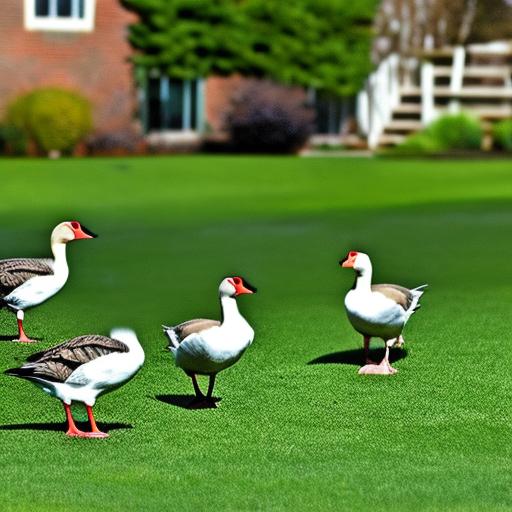Geese invading lawns is a common problem that many homeowners face. These large birds can cause damage to lawns, leave behind droppings, and even become aggressive towards humans and pets. Finding humane solutions to deter geese is essential to maintain a peaceful and clean outdoor space. In this article, we will explore various methods for geese control, including natural deterrents, physical barriers, decoys, sound deterrents, and making your lawn less attractive to geese. By understanding the behavior of geese and implementing these strategies, you can effectively keep them away from your property.
Key Takeaways
- Geese are social animals and tend to stay in groups, making it difficult to scare them away.
- Natural deterrents like planting certain types of grass or using predator urine can help keep geese away.
- Installing physical barriers like fences or netting can prevent geese from accessing your lawn.
- Using decoys like fake predators or other animals can trick geese into thinking it’s not safe to land.
- Making your lawn less attractive to geese by removing food sources and keeping it well-maintained can discourage them from staying.
Understanding the behavior of geese
To effectively deter geese from invading your lawn, it is important to understand their behavior and what attracts them to lawns in the first place. Geese are attracted to lawns because they provide easy access to food sources such as grass, insects, and seeds. They also prefer open spaces where they can easily spot potential predators. Geese are social animals and tend to gather in large groups, making it difficult to scare them away.
Geese are known for their territorial behavior and will defend their nesting sites aggressively. They can become aggressive towards humans and pets if they feel threatened or if their nests are disturbed. This territorial behavior makes it challenging to deter geese using traditional methods such as scarecrows or loud noises. Understanding these behavior patterns will help you choose the most effective methods for geese control.
Natural deterrents for geese
One of the most humane ways to deter geese from invading your lawn is by using natural methods. Planting certain types of vegetation can make your lawn less attractive to geese. They prefer short grass, so allowing your lawn to grow slightly longer can discourage them from landing and feeding. Additionally, planting tall grasses or shrubs around the perimeter of your lawn can create a physical barrier that makes it more difficult for geese to access your property.
Another natural deterrent is using scents that geese find unpleasant. Geese have a strong sense of smell, and certain scents can deter them from landing on your lawn. Some common scents that repel geese include citrus, peppermint, and vinegar. Spraying these scents around your lawn or using scented repellent products can help keep geese away.
Installing physical barriers
Physical barriers are an effective way to keep geese away from your lawn. Fences or netting can be installed around the perimeter of your property to prevent geese from accessing your lawn. It is important to ensure that the fence or netting is at least three feet high to prevent geese from flying over it. Additionally, the bottom of the fence or netting should be buried in the ground to prevent geese from crawling underneath.
Another physical barrier option is installing floating barriers in bodies of water near your property. Geese often use bodies of water as landing and feeding areas, so placing floating barriers can prevent them from accessing your lawn. These barriers create a physical obstacle that makes it difficult for geese to land and walk onto your property.
Using decoys to keep geese away
Decoys can be an effective way to scare off geese and prevent them from invading your lawn. Fake predators, such as plastic owls or coyotes, can be placed strategically around your property to create the illusion of danger. Geese are naturally wary of predators and will avoid areas where they perceive a threat.
Another decoy option is using other animals that geese consider a threat. For example, placing a few well-trained dogs in your yard can deter geese from landing and feeding. The presence of dogs will make geese feel unsafe and encourage them to find another location.
Making your lawn less attractive to geese

Making your lawn less appealing to geese is another effective way to deter them from invading your property. Removing food sources such as fallen fruit, bird feeders, or open garbage cans can discourage geese from landing and feeding on your lawn. Additionally, reducing the amount of water available on your property can make it less attractive to geese. Fixing any leaks or drainage issues and removing standing water can help deter geese from landing.
Changing the landscape of your lawn can also make it less attractive to geese. Adding obstacles such as rocks, bushes, or decorative fencing can create barriers that make it difficult for geese to access your lawn. Geese prefer open spaces where they can easily spot predators, so creating a more cluttered landscape can discourage them from landing.
Using sound deterrents to scare off geese
Sound deterrents can be an effective way to scare off geese and prevent them from invading your lawn. Loud noises such as clapping, banging pots and pans, or using air horns can startle geese and encourage them to fly away. Another option is using predator calls or distress calls that mimic the sounds of natural predators or injured birds. Geese are naturally wary of these sounds and will avoid areas where they hear them.
It is important to note that sound deterrents may only provide temporary relief as geese can become habituated to certain sounds over time. Therefore, it is recommended to use sound deterrents in combination with other methods for long-term geese control.
Humane methods for keeping geese away
When implementing methods for geese control, it is crucial to prioritize humane solutions that do not cause harm to the birds or the environment. Avoid using harmful chemicals or physical harm to deter geese. Instead, focus on methods that create a safe and unattractive environment for geese without causing them unnecessary distress.
Using humane methods not only aligns with ethical considerations but also helps maintain a healthy ecosystem. Geese play an important role in the environment, and it is essential to find a balance between deterring them from invading lawns and respecting their natural behaviors.
Seeking professional help for geese control
If you are facing persistent geese problems and are unsure how to effectively deter them from your property, it may be beneficial to seek professional help. Wildlife removal services specialize in humane geese control and can provide expert advice and assistance. They have the knowledge and experience to assess your specific situation and recommend the most effective methods for geese control.
Professional help can also ensure that all methods used are in compliance with local regulations and laws regarding wildlife management. They can guide you through the process of obtaining any necessary permits or permissions for implementing certain deterrent methods.
Educating your community on geese management
Geese management is not just an individual effort but also a community responsibility. Educating your neighbors and community members on the importance of geese control can help create a collective effort to prevent geese from invading lawns. Sharing information on effective deterrent methods, the importance of using humane solutions, and the potential risks associated with geese invasion can encourage others to take action.
Collaborating with local authorities, homeowner associations, or environmental organizations can also help raise awareness about geese management. Hosting workshops or informational sessions can provide a platform for community members to learn about effective geese control methods and share their experiences.
Staying proactive in preventing geese from invading your lawn
Preventing geese from invading your lawn requires a proactive approach that combines various methods for geese control. It is important to regularly assess your property for any potential attractants or vulnerabilities that may encourage geese to land and feed. By staying vigilant and addressing these issues promptly, you can maintain a goose-free lawn.
Implementing a combination of natural deterrents, physical barriers, decoys, sound deterrents, and making your lawn less attractive to geese will increase the effectiveness of your geese control efforts. It is also important to regularly monitor and adjust your methods as geese may become habituated to certain deterrents over time.
Geese invading lawns can be a frustrating problem for homeowners, but with the right knowledge and strategies, it is possible to deter them in a humane and effective manner. Understanding the behavior of geese, implementing natural deterrents, installing physical barriers, using decoys and sound deterrents, making your lawn less attractive, seeking professional help, educating your community, and staying proactive are all key components of successful geese control.
By taking action and implementing these methods, you can create a peaceful and clean outdoor space that is free from geese invasion. Remember to prioritize humane solutions that respect the birds and the environment while effectively deterring them from your property. With a proactive approach and a combination of methods, you can enjoy a goose-free lawn year-round.
If you’re looking for ways to keep geese off your lawn, you might also be interested in learning about the mating season for turkeys. Understanding their breeding habits can help you create a strategy to deter geese effectively. Check out this informative article on Poultry Wizard to gain insights into turkey mating behavior and how it can relate to managing geese on your property. Additionally, if you’re considering building a chicken coop as part of your goose control plan, you may find inspiration from the A-Frame Chicken Coop design featured on Poultry Wizard’s website.
Meet Walter, the feathered-friend fanatic of Florida! Nestled in the sunshine state, Walter struts through life with his feathered companions, clucking his way to happiness. With a coop that’s fancier than a five-star hotel, he’s the Don Juan of the chicken world. When he’s not teaching his hens to do the cha-cha, you’ll find him in a heated debate with his prized rooster, Sir Clucks-a-Lot. Walter’s poultry passion is no yolk; he’s the sunny-side-up guy you never knew you needed in your flock of friends!







